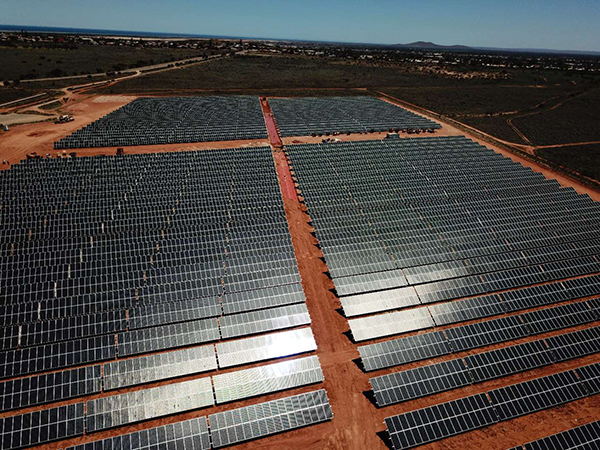While better known for British billionaire Sanjeev Gupta’s plans to power the OneSteel steelworks with a combination of 200 MW PV, coupled to utility scale battery and pumped hydro storage, South Australian industrial town Whyalla is also the first utility scale solar farm to be completed in the state.
The 6 MW Whyalla Solar Power Plant was initiated in 2015. It was developed by China’s SSE. It is the first PV power plant to have been developed in South Australia and is the first of the three-stage PV project at the Whyalla industrial site that will total 18 MW of capacity once completed.
China’s Jinergy supplied 17,280 mono-PERC modules to the project. The manufacturer claims that its PERC cells can reach a conversion efficiency of 21.6%.
Passivated emitter rear contact (PERC) technology was pioneered by UNSW’s Martin Green. It is now relatively commonly deployed by PV cell producers in China and elsewhere.
Alongside its PERC production, Jinergy is one of the few Chinese manufacturers pursuing heterojunction (HJT) cell technology. In April 2017, Jinergy announced that it had begun mass production of HJT cells, achieving conversion efficiencies over 23%. HJT cells have an additional advantage of demonstrating a better temperature coefficient, when compared to conventional crystalline silicon PV.
Speaking at the commissioning of the 6 MW Whyalla project, Major Projects Director of SSE Australia, Colin Gillam by the end of this year the company plans to have completed four PV power plant projects in the region.
This content is protected by copyright and may not be reused. If you want to cooperate with us and would like to reuse some of our content, please contact: editors@pv-magazine.com.









2 comments
By submitting this form you agree to pv magazine using your data for the purposes of publishing your comment.
Your personal data will only be disclosed or otherwise transmitted to third parties for the purposes of spam filtering or if this is necessary for technical maintenance of the website. Any other transfer to third parties will not take place unless this is justified on the basis of applicable data protection regulations or if pv magazine is legally obliged to do so.
You may revoke this consent at any time with effect for the future, in which case your personal data will be deleted immediately. Otherwise, your data will be deleted if pv magazine has processed your request or the purpose of data storage is fulfilled.
Further information on data privacy can be found in our Data Protection Policy.